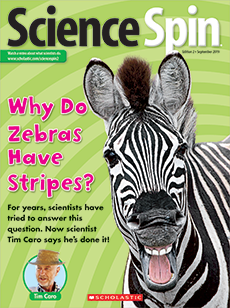OOPS! Lesson Plan
Academic Standards
Reading Objective:
Children will learn that heating can cause reversible and irreversible changes.
Reading Level:
Lexile: 470L; GRL: J
Next Generation Science Standards:
2-PS1-4 Some changes caused by heating and cooling can be reversed, and some cannot.
Vocabulary:
reversible, irreversible
Use these questions to check students’ understanding and stimulate discussion:
1. If you burn toast, can you fix that? Can you turn the burned toast back into soft bread? (no)
2. If you melt a chocolate bar, can you fix that? Can you turn it back into a bar of chocolate? (yes)
3. If you cook an egg too much, can you fix that? Can you make the yolk runny again? (no)
4. What do you call a change you can’t fix (irreversible)
Go online to print or project the Reading Checkpoint.
- Fresh bread is soft and has water in it. Heat from the toaster makes the water come out of the bread. Without the water, bread gets dry and stiff.
- Bread has proteins and sugars in it. When the toaster heats bread, the protein and sugars come together to make it golden, toasty, and delicious.
Materials: a loaf of sliced bread, a toaster, a knife to cut toast, pencils, copies of the skill sheet
Overview: Children will watch an adult heat bread in a toaster for shorter and longer amounts of time to see how the bread changes.
Directions:
1. Ahead of time: Bring in a toaster from home. Experiment a little on your own first. How long does it take your toaster to make toast that is lightly toasted? How long to make darker toast? Write those times down.
2. Begin the activity. Tell students you will explore how heat from a toaster changes bread. More heat equals more change!
3. Put 1-2 slices of bread in the toaster. Toast until lightly toasted (using the amount of time already determined). Cut the toast into small pieces, giving each kid or group of kids a piece to observe.
4. Now make dark toast. Give kids a sample to investigate. How is it different? Which kind do they prefer? Record observations on the skill sheet.
